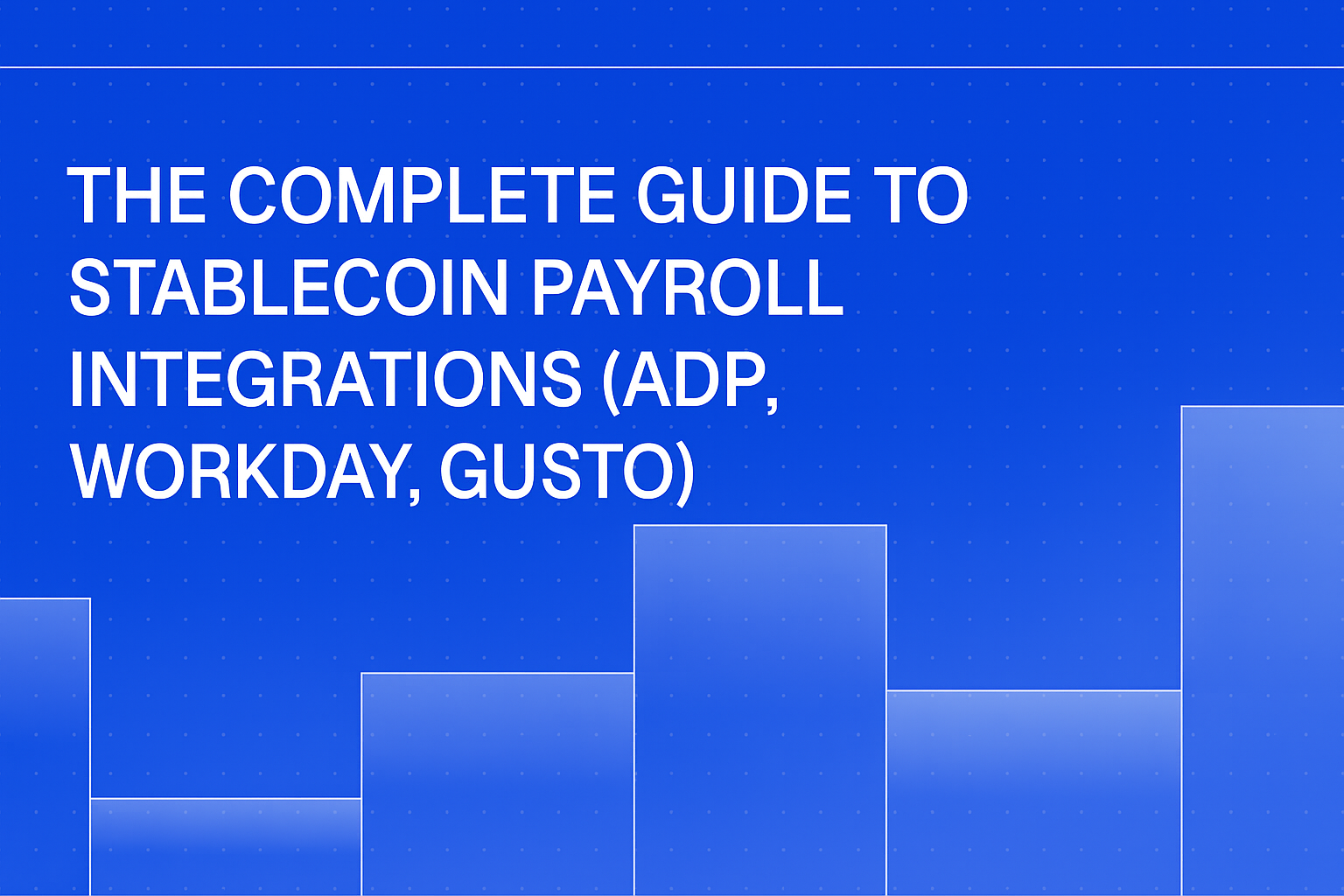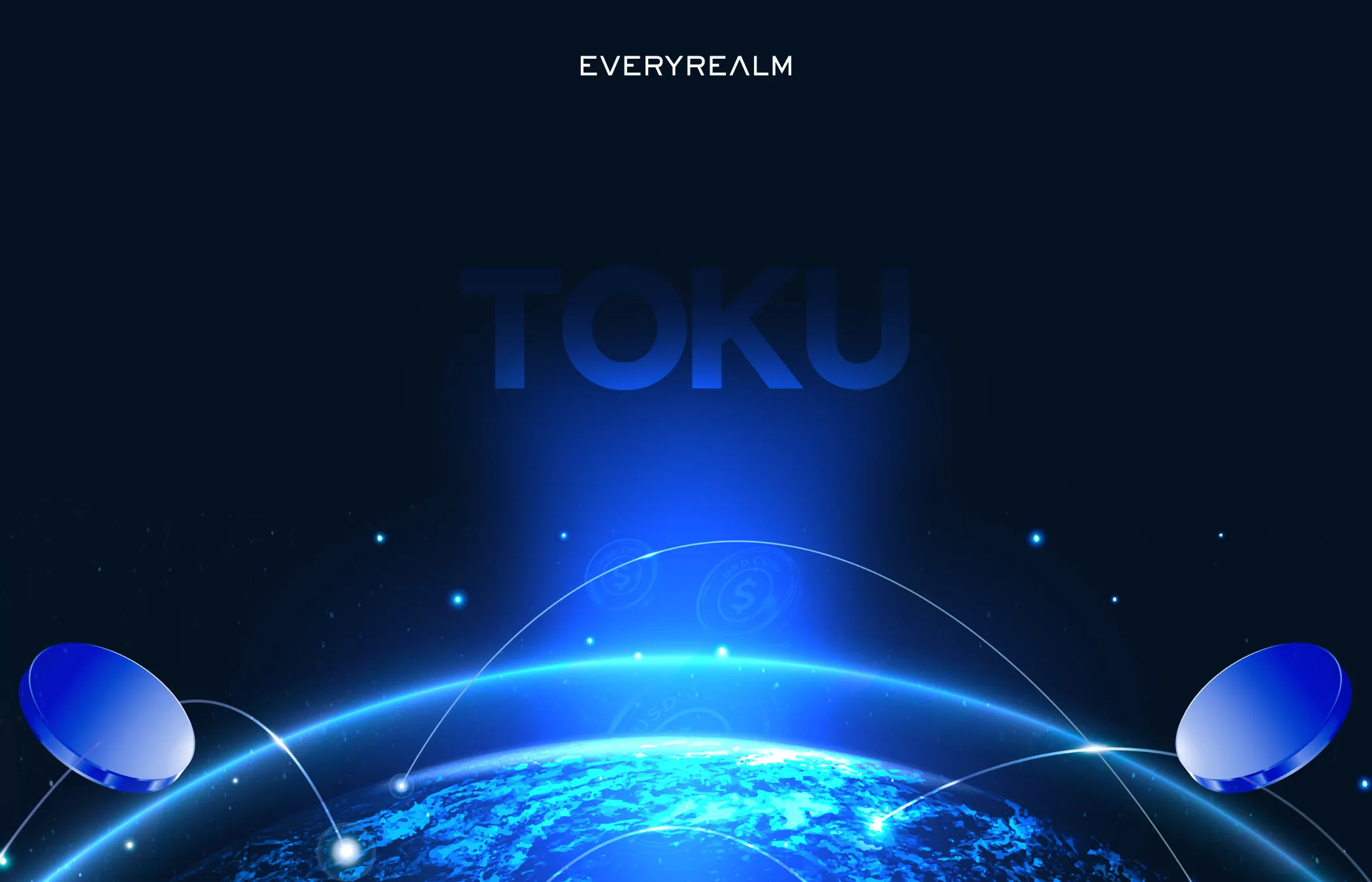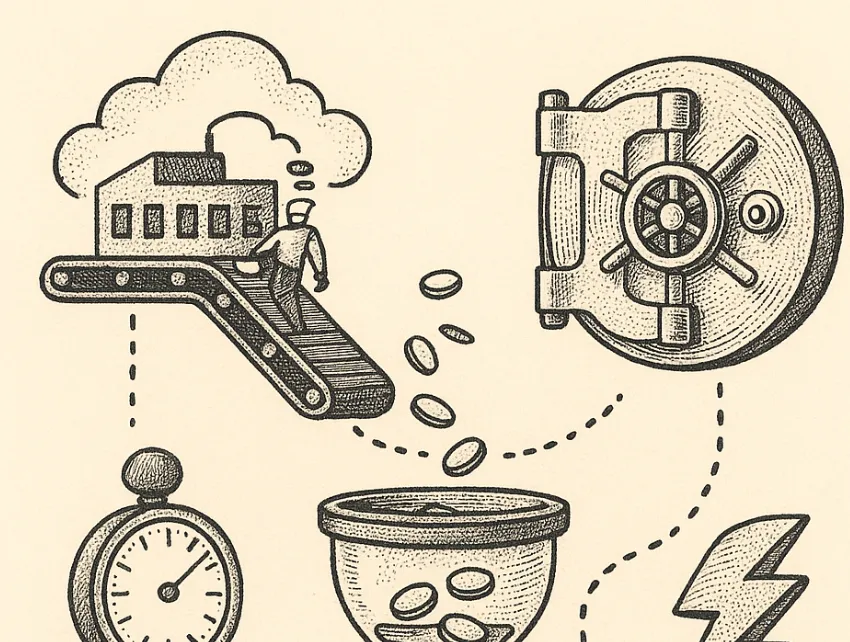
The Complete Guide to Stablecoin Payroll Integrations (ADP, Workday, Gusto)
Learn how finance teams integrate stablecoin payroll into ADP, Workday, and Gusto using Toku’s API - compliant, instant, and disruption-free.

.avif)
What You’ll Learn
- What a stablecoin payroll integration actually is and why it matters
- How Toku connects stablecoin payouts directly to ADP, Workday, and Gusto
- Step-by-step: from data mapping to on-chain execution and reconciliation
- Compliance, security, and audit controls that make stablecoin payroll enterprise-ready
- Why hybrid payroll (fiat + stablecoin) is the next frontier in global compensation
The Payroll Revolution Is Already Here
If you run payroll for a global team, you’ve probably felt the strain.
Wire transfers crawl across borders. FX fees appear where they shouldn’t. Contractors message at 2 a.m. asking, “Did it land yet?” Meanwhile, Finance is stuck reconciling multiple currencies, HR is managing mismatched pay cycles, and leadership wants the whole process faster, cheaper, and cleaner.
The global workforce has gone borderless - but traditional payroll rails haven’t kept up.
That’s why finance leaders are turning to stablecoins: digital assets like USDC that maintain a 1:1 peg to the dollar. They settle in seconds, move 24/7, and eliminate the drag of intermediary banks. But the real innovation isn’t in the coins themselves - it’s in how companies can integrate them into existing payroll systems like ADP, Workday, and Gusto without disrupting a single workflow.
That’s where Toku comes in.
Toku is the compliance-first infrastructure layer that brings instant, stablecoin-native payroll to the systems you already trust
No migrations. No new software to learn. No risk of “crypto chaos.
You keep ADP, Workday, or Gusto as your source of truth
Toku simply adds a stablecoin payout layer behind the scenes - executing compliant, on-chain payments while syncing every record back to your payroll system for reconciliation and reporting.
This “add, don’t replace” model solves the biggest barrier to innovation for finance and HR teams:
you can modernize your payout rails without rebuilding the systems your organization already depends on.
Why does that matter? Because payroll isn’t just a payment - it’s a compliance event
Every transaction touches tax withholding, benefits, employment law, and financial reporting
The wrong integration can expose a company to risk
The right one - Toku’s - brings speed, transparency, and automation while staying aligned with global regulations in 100+ countries.
Stablecoin payroll is no longer a crypto experiment.
It’s the future of how distributed companies pay and retain talent.
And with Toku, that future works inside the stack you already have.
Read on to see how stablecoin payroll integrations actually work - and how Toku connects seamlessly with ADP, Workday, and Gusto.
What Is a Stablecoin Payroll Integration?
Let’s start with what it’s not.
A stablecoin payroll integration isn’t about “paying in crypto” or replacing your existing payroll system.
It’s about extending your current payroll rails - ADP, Workday, Gusto, or another HRIS - with instant, compliant payout capabilities powered by stablecoins like USDC.
In simple terms: Your payroll system remains the source of truth for employee data, pay cycles, and approvals. Toku acts as the execution layer that converts approved payroll data into on-chain, stablecoin payments.
The result?
Finance and HR teams get faster, lower-cost payments that reconcile cleanly with the tools they already use - without touching a line of blockchain code.
How It Works in Practice
When a payroll run is processed in ADP, Workday, or Gusto, Toku receives the finalized pay data (amounts, employees, pay dates, memos) via secure API or structured sync.
Toku then:
- Maps those payments to compliant stablecoin equivalents (usually USDC, but others like USDT or PYUSD can be supported).
- Executes the transactions on-chain through regulated custodial partners.
- Syncs confirmations - including transaction hashes, timestamps, and fiat equivalents - back into your payroll records.
To the finance team, it feels just like any other payroll run. The difference? Settlement happens in seconds, not days.
Why API-Based Integrations Matter
APIs are the quiet power behind modern finance. They let systems talk to each other - securely, automatically, and without human error.
That’s the foundation of Toku’s model.
Rather than rebuild payroll from scratch, Toku integrates at the data layer, connecting to trusted platforms like ADP, Workday, and Gusto through well-documented APIs or file-based workflows.
This approach means:
- No migrations or retraining: Keep your existing processes, approvals, and compliance checks.
- No manual reconciliation: All payout confirmations sync automatically for finance and audit.
- No security compromises: Toku never alters your core payroll data, it simply executes the final leg of payment delivery via blockchain.
It’s the same reason ADP Marketplace apps and Workday’s Cloud Connect ecosystem exist: to let verified third-party solutions extend the capabilities of enterprise systems safely and efficiently.
Toku applies that same principle to stablecoin payroll.
Stablecoin Payroll ≠ “Crypto Payroll”
Let’s be clear: paying in Bitcoin or tokens is not payroll
Payroll requires stability, compliance, and auditability
That’s why stablecoins - especially USDC, with its dollar peg and transparent reserves - are the logical next step for global compensation.
By integrating stablecoins into payroll rather than replacing it, companies gain the benefits of blockchain speed and cost-efficiency without any of the volatility or legal uncertainty associated with traditional crypto assets.
This is payroll modernization, not experimentation.
Why It Matters to Finance and HR Leaders
For finance, the value is simple: fewer intermediaries, faster access to funds, and cleaner reconciliation.
For HR and compliance teams, it means maintaining full control over classification, tax documentation, and employee experience - all while unlocking 24/7 global payout capabilities.
A stablecoin payroll integration isn’t about changing what works.
It’s about future-proofing your payroll stack with an additional layer of speed, compliance, and control - powered by Toku’s API.
Why Traditional Payroll Systems Can’t Support Crypto Natively
ADP, Workday, and Gusto are optimized for fiat payroll, not blockchain rails. They handle taxes, benefits, and reporting beautifully, but none were built for digital wallets or on-chain settlement.
When teams try to bolt on crypto manually, problems appear fast: reconciliation gaps, mismatched data, and unclear reporting ownership. Who verifies the USD equivalent? Where does the audit trail live?
That’s why the safest pattern isn’t to replace these systems, it’s to extend them. Toku connects through secure APIs, handling the blockchain execution layer while ADP or Workday remain your single source of truth.
The result: compliant, instant stablecoin payouts with zero disruption to HR or Finance operations.
The System Gap: Payroll vs. Blockchain
Traditional payroll systems were never designed to touch a blockchain.
They can’t hold a wallet address. They don’t recognize a transaction hash.
Their ledgers expect routing and account numbers, not public keys.
Here’s what happens when teams try to “bolt on” crypto payouts manually:
- Reconciliation gaps: Once payments leave the payroll system, there’s no automatic record of where, when, or how they settled on-chain. Finance ends up manually matching blockchain data to payroll runs - an accountant’s nightmare.
- Compliance exposure: Without integrated KYC, AML, or fair market value tracking, it’s nearly impossible to produce compliant documentation for auditors or tax authorities.
- Data drift: The HRIS (ADP, Workday, Gusto) and the payment execution layer start to diverge. What the system says was “paid” doesn’t necessarily match what hit the blockchain.
- Employee experience issues: Employees receive manual crypto transfers instead of payslips. There’s no formal record of deductions, benefits, or gross-to-net breakdowns - creating mistrust and legal risk.
It’s not that legacy systems are outdated, they’re just closed ecosystems.
They excel at structured workflows, compliance logic, and integrations within their own networks.
What they can’t do - and shouldn’t - is natively process blockchain transactions.
That’s where Toku’s API layer changes the game.
Why Direct Blockchain Integration Is Risky
When teams attempt to connect a blockchain wallet directly to a payroll system, they’re bypassing the controls that make enterprise payroll secure and auditable.
Consider the risks:
- No built-in KYC/AML: Blockchain wallets don’t verify identity by default. That’s a compliance red flag.
- No jurisdictional logic: Minimum wage, tax withholding, and reporting requirements vary by country. Traditional crypto tools ignore these rules entirely.
- No tax documentation: If payments are made directly from a wallet, how do you generate W-2s, 1099s, or country equivalents?
- No audit trail: Regulators expect proof that every payment corresponds to an approved, lawful employment relationship. Without integration, those links vanish.
For a global company, that’s not innovation - it’s liability.
The Safer Pattern: Bridge, Don’t Replace
Finance leaders don’t want another payroll system. They want a bridge - one that lets them modernize payouts without dismantling the core infrastructure that already works.
That’s why Toku was built as an integration-first platform.
Instead of trying to make ADP, Workday, or Gusto “go crypto,” Toku extends their capabilities with a compliant, blockchain-native payout layer.
Here’s the principle:
Keep your HRIS and payroll as the system of record. Let Toku handle the blockchain execution. Sync everything back automatically for reconciliation, compliance, and reporting.
This architecture allows:
- Full transparency across both fiat and stablecoin payrolls.
- Automated compliance workflows (KYC, AML, fair market value, tax).
- Zero disruption to HR, Finance, or employee processes.
It’s not about rebuilding payroll. It’s about future-proofing it - with stablecoin rails that plug into the systems you already trust.
How Stablecoin Payroll Integrations Work (Step-by-Step)
So how does stablecoin payroll actually work inside an enterprise environment like ADP, Workday, or Gusto?
The short answer: it doesn’t replace your payroll system - it extends it.
Toku’s integration model treats your HRIS or payroll platform as the single source of truth, using secure APIs or structured file syncs to transmit pay data for execution on-chain. The entire process runs in parallel with your existing cycles - fully auditable, compliant, and invisible to your teams.
Let’s break it down.
Step 1: Data Flow and Mapping
It starts where every payroll run begins - inside your system of record.
When your team processes payroll in ADP, Workday, or Gusto, each pay item includes core details:
- Employee or contractor ID
- Payment amount and currency
- Pay date and frequency
- Department or entity codes
- Notes or memos (e.g., bonuses, reimbursements)
Toku connects through a secure API or scheduled data sync, reading only the relevant, approved payroll line items. No sensitive personal data leaves your HRIS unnecessarily - everything runs through encrypted channels and controlled permissions.
Once mapped, Toku automatically aligns those records with corresponding wallets and payout preferences (USDC, USDT, PYUSD, or hybrid fiat + stablecoin options).
For most finance teams, it feels like adding a new payment rail, not a new platform.
Step 2: Stablecoin Conversion and Blockchain Execution
After payroll data is validated and mapped, Toku converts the fiat values into their stablecoin equivalents at the fair market exchange rate at the moment of execution.
From there, Toku initiates the transaction through regulated custodial partners - ensuring all stablecoin transfers occur within compliant, traceable environments.
Supported stablecoins include:
- USDC (preferred) - transparent, regulated, and ideal for global payroll.
- USDT, DAI, PYUSD - supported based on policy and jurisdiction.
Each transaction is executed on-chain in seconds, with immediate confirmations and built-in visibility for finance and audit teams.
For hybrid models (part-fiat, part-stablecoin), Toku’s system can split payments automatically - routing each portion to the correct account or wallet without manual intervention.
Think of it as programmable payroll: one data set, multiple payout rails, perfect reconciliation.
Step 3: Compliance and Reconciliation
Here’s where Toku’s architecture really stands apart.
Every on-chain payout is accompanied by compliance logic that mirrors the expectations of traditional payroll systems:
- KYC and AML screening: each payee and transaction is verified before execution.
- Fair market value (FMV) logging: stablecoin amounts are pegged to USD value at the moment of payment.
- Tax documentation: Toku automatically prepares equivalent W-2, 1099, or local tax records where required.
- Jurisdiction-aware rules: labor laws, minimum wage thresholds, and classification logic are applied per country.
All of this happens automatically - the same way ADP or Workday handles benefits or deductions, just adapted for blockchain rails.
Once payments are complete, Toku syncs all metadata - transaction hash, confirmation time, FMV - back into your payroll records.
Your audit trail remains intact, with a 1-to-1 match between fiat records and on-chain transactions.
Step 4: Reporting and Sync-Back
For Finance, the magic is in the reconciliation.
Each pay cycle produces a detailed report that includes:
- Employee or contractor name
- Payment date and type (fiat, stablecoin, or split)
- Stablecoin value and USD equivalent
- Transaction hash and status
- Employer tax and withholding notes (where applicable)
This report can be exported directly into your accounting system (QuickBooks, Xero, or ERP), ensuring continuity from payroll to ledger.
For HR, nothing changes - payslips, employee records, and onboarding data still live inside ADP, Workday, or Gusto.
For Finance, visibility improves - every transaction now has a digital fingerprint on-chain.
Step 5: Confirmation and Transparency
Once payments are complete, Toku pushes confirmations and transaction details back to your payroll or HRIS system automatically.
The result:
- One-click access to payment verification.
- Unified reporting across fiat and stablecoin cycles.
- Audit-ready exports for finance, compliance, or tax authorities.
This sync ensures your team never loses track of where funds went, when they settled, or how they were documented.
It’s the same level of control you expect from enterprise payroll - just faster, cheaper, and globally scalable.
The Bottom Line
A stablecoin payroll integration doesn’t reinvent payroll.
It simply adds programmable payment rails beneath your existing systems, automating what used to take days and simplifying what used to require multiple vendors.
With Toku, your team can pay employees and contractors worldwide - instantly, compliantly, and without disrupting a thing.
Ready to see how stablecoin payroll actually fits into your stack?
Explore Toku Payroll - the platform that brings instant, compliant stablecoin payouts to ADP, Workday, and beyond.
Supported Integrations: ADP, Workday, and Gusto
Every finance leader knows: payroll systems are sacred. You don’t just swap them out.
That’s why Toku doesn’t replace ADP, Workday, or Gusto - it extends them.
Each of these systems already manages complex HR, tax, and reporting workflows brilliantly. What they can’t do natively is execute stablecoin payments or handle blockchain data. That’s where Toku’s integration layer fits - cleanly, securely, and without changing the way your team works today.
Let’s break down how these integrations actually work in practice.
ADP: Global Scale Meets Stablecoin Speed
ADP powers payroll for some of the largest enterprises in the world. Its infrastructure is built for scale - but it’s deeply tied to traditional banking rails.
Toku connects to ADP through secure APIs and data exports to read payroll line items as soon as they’re finalized. Once received, Toku executes those payments on-chain in stablecoins (most often USDC) and syncs confirmations back to ADP.
Key integration highlights:
- Secure connection via ADP API Central or scheduled CSV sync.
- One-to-one mapping between ADP pay items and Toku payouts.
- Audit-ready logs showing stablecoin value, fiat equivalent, and transaction ID.
- Compliance continuity: W-2s, 1099s, and tax documentation remain within ADP.
Ideal for:
Enterprises with distributed contractor networks, Web3 treasury operations, or subsidiaries operating across high-cost wire corridors (LATAM, Africa, Asia).
Example use case:
A U.S. fintech keeps ADP as its primary payroll engine for all employees but uses Toku to pay international contractors in USDC. No wires, no FX spreads - just compliant, same-day settlement.
For finance teams, nothing changes. Payroll runs start in ADP, approvals happen in ADP, and records reconcile in ADP. The only difference? Payments clear globally in seconds.
Want to see how stablecoin payroll fits directly into your ADP workflows?
Explore Toku’s ADP integration - add instant, compliant stablecoin payouts without changing how you run payroll.
Workday: Deep Data Flows and Enterprise Flexibility
Workday’s strength lies in its flexibility and data depth. It’s the backbone of many mid-market and enterprise HR environments, powering everything from payroll to performance reviews. But like ADP, it’s limited to fiat payment rails.
Toku integrates through Workday’s Cloud Connect for Third-Party Payroll - the same mechanism used for external providers worldwide. This means Toku fits neatly into Workday’s existing architecture, without needing custom development or risky workarounds.
Key integration highlights:
- Connection via Workday’s Third-Party Payroll API or Global Payroll Cloud.
- Direct mapping of payroll results to Toku’s payout module.
- Synchronized payment confirmations and transaction hashes returned to Workday.
- Full adherence to regional compliance logic - including tax and benefits structures.
Ideal for:
Enterprises or multinational organizations that want to modernize payouts globally while maintaining strict compliance and audit standards.
Example use case:
A global tech company with entities in the U.S., Europe, and Singapore keeps Workday as its HRIS and source of truth. Using Toku, it enables instant USDC payments for contractors in markets with limited banking access. Workday still manages onboarding, benefits, and tax data - while Toku handles payout execution and blockchain reconciliation.
The result is the same HR and finance visibility Workday is known for - just powered by faster, programmable rails.
Managing global payroll through Workday?
Learn how Toku integrates with Workday to bring compliant, blockchain-based payments into your existing HR and finance stack.
Gusto: The Startup-Ready Integration
Gusto is a favorite among startups and SMBs because it makes payroll approachable and automated. But even for agile teams, global expansion exposes the limits of bank-based payouts.
Toku connects with Gusto through API or structured file sync, enabling startups to offer stablecoin payouts to contractors, advisors, or remote hires - all while keeping Gusto as the primary HR and payroll hub.
Key integration highlights:
- Quick setup - typically live in under one week.
- Hybrid payout support: combine fiat for employees and stablecoins for contractors.
- Automated reconciliation and reporting - no manual spreadsheet merges.
- Simplified tax and compliance coverage for 100+ countries.
Ideal for:
Early-stage and growth-stage companies scaling globally without dedicated payroll infrastructure in every country.
Example use case:
A SaaS startup using Gusto for U.S. employees adds Toku to pay overseas engineers in stablecoins. Gusto remains the payroll interface; Toku handles the blockchain side, syncing confirmations and USD equivalents automatically. The finance team gains global reach with zero disruption.
Running payroll through Gusto?
See how Toku’s Gusto integration helps startups and growing teams add stablecoin payments without any disruption.
The Common Thread: Seamless Integration, Real Compliance
Whether you run ADP, Workday, or Gusto, the principle is the same:
Keep your current systems. Let Toku handle the blockchain execution.
That architecture ensures:
- No process change for HR or Finance.
- No migration risk - all data stays in your existing platforms.
- No compliance gaps - Toku’s automation covers AML, KYC, and tax logic globally.
- Full transparency - every payout, on-chain and off, reconciles 1-to-1 with your system of record.
Toku was built with this reality in mind. Finance teams don’t want another payroll platform. They want faster rails, cleaner visibility, and fewer headaches - without changing what already works.
That’s exactly what stablecoin payroll integrations deliver.
Compliance and Risk Management
Stablecoin payroll only works if compliance is airtight - and that’s where Toku leads.
Every payout through Toku is governed by automated regulatory controls designed for finance and HR leaders who need transparency, not trial and error.
What’s built in:
- KYC/AML screening for every wallet and recipient, aligned with FATF and OFAC standards.
- Jurisdiction-specific tax logic and documentation for 100+ countries.
- Sanctions and fraud monitoring embedded into every payment flow.
- SOC 2–compliant infrastructure and full audit logs for every transaction.
In the U.S., Toku maps each payment to USD fair market value and auto-generates W-2 or 1099 forms to meet IRS and FLSA standards.
In the EU, MiCA compliance ensures proper reporting and asset transparency.
Across LATAM, Toku aligns with evolving crypto tax frameworks to protect both employer and employee.
Your existing payroll system remains the single source of truth; Toku simply adds a compliant execution layer under the hood - so your audit trail stays unified, clear, and regulator-ready.
Need country-specific compliance info?
Implementation Timeline: How Long Does Integration Take?
Stablecoin payroll sounds futuristic, but setting it up with Toku is surprisingly fast. Integrating stablecoin payroll doesn’t require rebuilding your stack, it’s a data connection.
Phase 1: Connect and Map
Link ADP, Workday, or Gusto via secure API or CSV sync. Payroll data flows directly into Toku.
Phase 2: Test and Validate
Run a sandbox cycle to confirm wallet verification, tax logic, and one-to-one reconciliation.
Phase 3: Go Live
Enable stablecoin payouts inside your existing payroll process. HR runs payroll as usual; Toku executes the blockchain settlements and syncs results back automatically.
Most teams complete the rollout in under one month with guided onboarding and compliance checks built in.
Benefits of Integrating Stablecoin Payroll
By layering Toku’s stablecoin infrastructure onto your existing payroll, you reduce cost and friction while gaining the compliance rigor enterprises demand.
The Future of Payroll: Hybrid Fiat + Stablecoin
The next era of payroll isn’t about replacing banks, it’s about combining the best of both worlds.
Hybrid payroll models are already emerging, where part of compensation runs through fiat systems (for base salaries and benefits) and part through stablecoins (for global contractors, bonuses, or token grants).
Toku is building for that reality. Its infrastructure connects traditional payroll systems to blockchain rails, creating a seamless bridge for finance teams who want speed without losing compliance or audit control.
Over the next few years, expect this to become standard: ADP or Workday as the backbone.
Toku as the execution layer. One source of truth - two payout options.
The Simplest Way to Modernize Global Payroll
The message is simple:
You don’t need to replace your payroll systems to modernize them.
With Toku, ADP, Workday, and Gusto remain intact. Toku just adds the rails - compliant, instant, auditable, and globally scalable.
- Finance gets: faster cycles, lower costs, and clean audit trails.
- HR gets: no process change.
- Employees get: faster access to their earnings anywhere in the world.
- Compliance gets: automated documentation across 100+ countries.
That’s what modernization looks like - not disruption, but integration.
Ready to See It in Action?
Toku helps global teams pay employees and contractors in stablecoins - legally, instantly, and at scale. Integrate compliant, programmable payroll directly into your ADP, Workday, or Gusto workflows.
Schedule a call to see how stablecoin payroll fits into your existing systems - without disrupting a thing.







